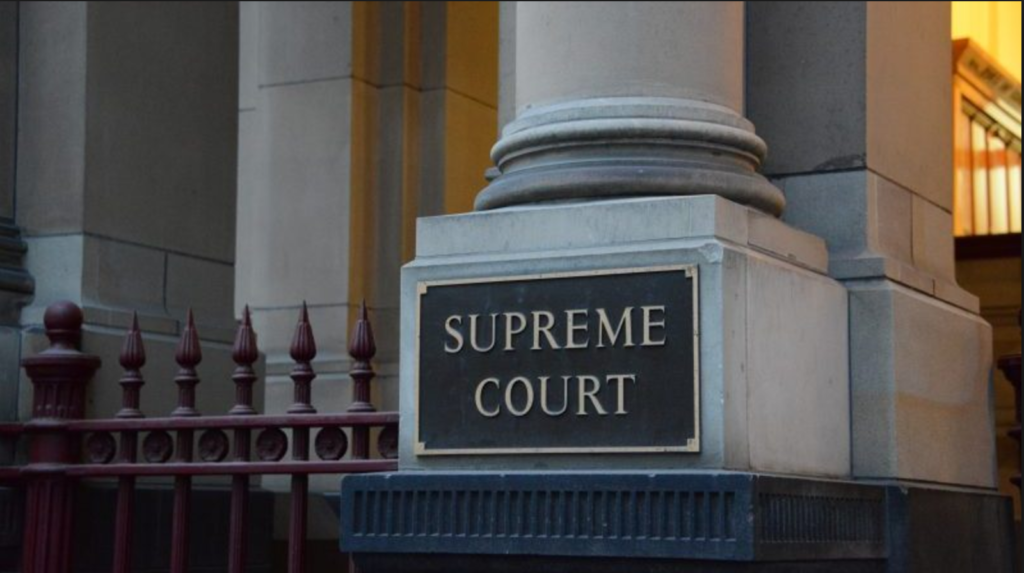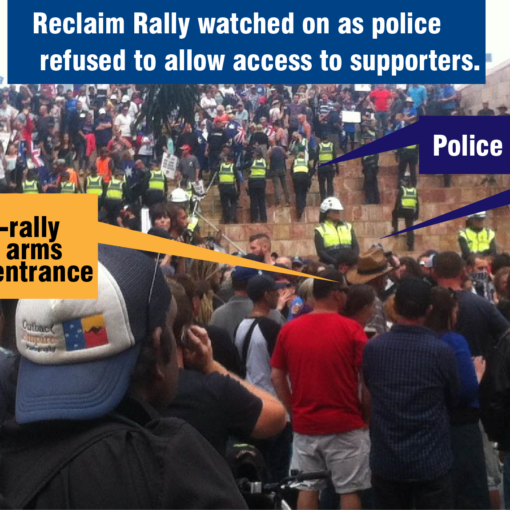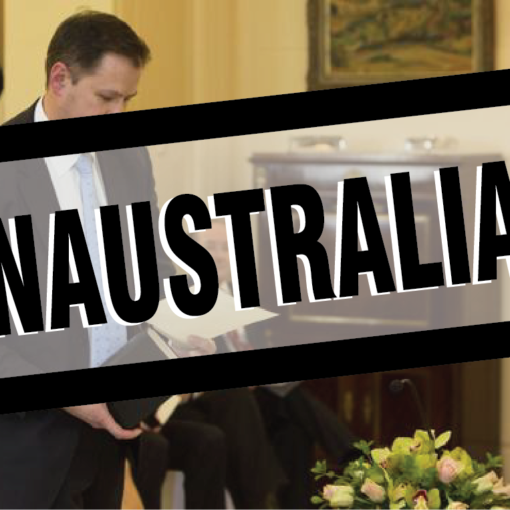
There is a reason why the majority of Australians are feeling voiceless in their own society. There is a violation to our freedoms that is being committed by multiculturalists in our government bodies… using “religious freedom”.
In 1982 the subject of Religion in Australia was investigated by the Supreme Court in Victoria over a case where Scientology wanted tax exemptions. In reviewing this case the judges made some crucial decisions about religion which removes the hold both “Secular Humanism” and Islam currently have on our society. The Government bias towards these two religions is also out of line with the way this Supreme Court Judgement viewed their powers and paves the way for us to take back our voice and demand immediate changes on both fronts.
The Judgement in a Nutshell
The definition of religion extends to belief structures that also don’t have a god. Why this is important to consider is that our schools are teaching a religion called “Secular Humanism” to the exclusion of all others. That is how the UN Agenda is making its way into our school systems. Secular Humanism rejects all form of religion as the basis of morality, relying instead on science and philosophy to form those judgements. It is how we end up with philosophies of same sex marriages, Safe School’s programs, gender equality and the rest of our current set of “humanist” belief structures being programmed onto our children—without our say.
Whether you agree with this stance or not, the fact that this religion—Human Secularism—is now being taught in schools to the exclusion of all others should be of concern to every Australian as it violates our individual freedom of religion. Our moral code is being decided by the State Government pushing its Communist religion of Human Secularism ignoring OUR individual Freedom to determine our moral code. My right as a free thinking parent NOT to have my children indoctrinated into Secular Humanism or Islam by the State must be upheld.
Secondly the freedom to practice a religion is given to the person—not the religion itself. That means people in Australia are free to believe in whatever they want but freedom of religion does not cover the belief system. There is no law to stop the criticism of any belief system and any attempt to introducing blasphemy legislation to stop the criticism of a religion goes against free thinking—the cornerstone of any free society.
But here is the extra kicker from the Supreme Court finding.—The practice of a religion if it offends the ordinary laws of Australia (as many of Islamic practices do), is no longer has immune under “freedom of religion”. In other words Muslims can and should be challenged at law for going outside our laws.
Further Islam could be challenged for its ongoing incitement against our ordinary laws. It could be easily proved that Muslims break our laws due to incitement from Imams and the fundamental teachings of Islam. One could make the case to ban the Koran and have it permanently removed from our shores, in its current form.
The practice of Islam violates our ordinary laws when it incites its believers to:
- kill people that leave Islam;
- kill people who criticise their religion or their prophet;
- kill gays;
- eradicate Jews;
- beat wives;
- practice polygamy;
- treat women as unequal;
- give men double the share of any inheritance;
- marry cousins to reproduce;
- child traffic;
- mutilate the genitals of their females;
- establish a caliphate and islamic governance into Australia;
- bring Australia under submission of islam;
- practice intolerance towards other religions and their adherents;
- adhere to islamic law above the law of any host country.
There are many other demands of Islam that are offensive to our society’s laws that would cause a believer on acting out any of these “religious practices” to offend the ordinary laws of Australia.
Islam through its Koran and various religious texts can be shown to render this religion incompatible with Australian law and outside the protection of UN’s “freedom of religion”.
This 1983 Ruling on Religion should allow Australians living in Victoria to mount a case for the exclusion of Islam in its current form as “unsuitable” for Australian society.
While we are at it let’s also remove Secular Humanism out of our education system. The fact that any STATE could push this Communist religion is illegal and needs to be challenged, stopped and removed out of our school system.
Here is a summary of the Supreme Court judges findings in more detail
For the Full judgement follow this link.
1. The term “Religion” extends to those beliefs that have a god…and those that do not.
“Among religions in this country which do not teach what would generally be considered a belief in the existence of God are Buddhism, Taoism, Ethical Culture, Secular Humanism and others.”
The Supreme Court had thus appeared to place within the concept of religion not only non-theistic religions but also systems of belief which had no supernatural element.
2. Religion answers meaning of life and supplies a moral code
“One’s views, be they orthodox or novel, on the deeper and more imponderable questions — the meaning of life and death, man’s role in the Universe, the proper moral code of right and wrong — are those likely to be the most ‘intensely personal’ and important to the believer. They are his ultimate concerns. As such, they are to be carefully guarded from governmental interference … ”
The second and third indicia are not the criteria of a religion, though they may frequently be found in a religion.
3 Freedom of Religion—from the law’s perspective —”one in, all in”
Religious Freedom. Religious freedom is a fundamental theme of our society. That freedom has been asserted by men and women throughout history by resisting the attempts of government, through its legislative, executive or judicial branches, to define or impose beliefs or practices of religion. Whenever the legislature prescribes what religion is, or permits or requires the executive or the judiciary to determine what religion is, this poses a threat to religious freedom. Religious discrimination by officials or by courts is unacceptable in a free society. The truth or falsity of religions is not the business of officials or the courts. If each purported religion had to show that its doctrines were true, then all might fail. Administrators and judges must resist the temptation to hold that groups or institutions are not religious because claimed religious beliefs or practices seem absurd, fraudulent, evil or novel; or because the group or institution is new, the number of adherents small, the leaders hypocrites, or because they seek to obtain the financial and other privileges which come with religious status. In the eyes of the law, religions are equal. There is no religious club with a monopoly of State privileges for its members. The policy of the law is “one in, all in”.
4 Freedom of Religion maintains freedom of conscience as essential of a free society
Freedom of religion, the paradigm freedom of conscience, is of the essence of a free society. The chief function in the law of a definition of religion is to mark out an area within which a person subject to the law is free to believe and to act in accordance with his belief without legal restraint. Such a definition affects the scope and operation of s. 116 of the Constitution and identifies the subject-matters which other laws are presumed not to intend to affect. Religion is thus a concept of fundamental importance to the law. Moreover, although this case does not arise under s. 116 of the Constitution or under any part of its fourfold guarantee of religious freedom, it is inevitable that the judgments in the Supreme Court, so long as they stand without consideration by this Court, will influence the construction placed upon s. 116 of the Constitution by other Australian courts.
5 Freedom of Religion, is for the adherents NOT the religion itself
cf. per Latham C.J. in Jehovah’s Witnesses Inc.(41). It is more accurate to say that protection is required for the adherents of religions, not for the religions themselves. Protection is not accorded to safeguard the tenets of each religion; no such protection can be given by the law, and it would be contradictory of the law to protect at once the tenets of different religions which are incompatible with one another. Protection is accorded to preserve the dignity and freedom of each man so that he may adhere to any religion of his choosing or to none. The freedom of religion being equally conferred on all, the variety of religious beliefs which are within the area of legal immunity is not restricted.
6 The State has no right to preference secular humanism in our education systems.
Under our law, the State has no prophetic role in relation to religious belief; the State can neither declare supernatural truth nor determine the paths through which the human mind must search in a quest for supernatural truth. The courts are constrained to accord freedom to faith in the supernatural, for there are no means of finding upon evidence whether a postulated tenet of supernatural truth is erroneous or whether a supernatural revelation of truth has been made. We would respectfully adopt what Douglas J. said in United States v. Ballard(44) in reference to the freedom of religious belief:
“It embraces the right to maintain theories of life and of death and of the hereafter which are rank heresy to followers of the orthodox faiths. Heresy trials are foreign to our Constitution. Men may believe what they cannot prove. They may not be put to the proof of their religious doctrines or beliefs. Religious experiences which are as real as life to some may be incomprehensible to others. Yet the fact that they may be beyond the ken of mortals does not mean that they can be made suspect before the law.”
7. The law grants us the right to choose to believe but our actions must remain within the law
The freedom to act [*136] in accordance with one’s religious beliefs is not as inviolate as the freedom to believe, for general laws to preserve and protect society are not defeated by a plea of religious obligation to breach them: cf. Cantwell v. Connecticut(46). Religious conviction is not a solvent of legal obligation.
In Reynolds v. United States(47), the Supreme Court held that to excuse polygamy on religious grounds would “make the professed doctrines of religious belief superior to the law of the land, and in effect … permit every citizen to become a law unto himself. Government could exist only in name under such circumstances.” Conduct in which a person engages in giving effect to his faith in the supernatural is religious, but it is excluded from the area of legal immunity marked out by the concept of religion if it offends against the ordinary laws, i.e. if it offends against laws which do not discriminate against religion generally or against particular religions or against conduct of a kind which is characteristic only of a religion.
8. Religious immunity stops where canons of conduct offend against the ordinary laws
We would therefore hold that, for the purposes of the law, the criteria of religion are twofold: first, belief in a supernatural Being, Thing or Principle; and second, the acceptance of canons of conduct in order to give effect to that belief, though canons of conduct which offend against the ordinary laws are outside the area of any immunity, privilege or right conferred on the grounds of religion.
The Case:
The Actions of followers of religions are subject to law
54 CLR 120, 57 ALJR 785, 14 ATR 769, 49 ALR 65, 83 ATC 4652
Scientology Case
The Church of the New Faith Appellant, Appellant;
and
The Commissioner of Pay-Roll Tax (Victoria) Respondent, Respondent.
On appeal from the Supreme Court of Victoria.
9-11 November 1982
27 October 1983
JUDGES: Mason A.C.J., Murphy , Wilson , Brennan and Deane JJ.
SUBJECT: Pay-roll Tax (Vict.) — Exemption — Religious or public benevolent institution — Scientology — Religion — Pay-roll Tax Act 1971 (Vict.), s. 10(b).
Section 10 of the Pay-roll Tax Act 1971 (Vict.) exempted from pay-roll tax wages paid or payable “by a religious or public benevolent institution, or a public hospital”.




20 thoughts on “Supreme Court: Islam, Humanism not protected by law”
It is going to be used in the Bendigo 3 case…so we will see.
The Koran, the hadith and the sira all can be banned under the “Terrorist Material Act”. They incite violence, intolerance and terrorism.
Hi Concit Admin, Was wondering if You managed to obtain a legal opinion regarding the above Supreme Court, Islam, Humanism, Not protected by Law - Your article 29th march 2017 ? Would be interested to see if has progressed further from that date ? Cheers and keep up the good fight.
THAT should read as …. secular humanism …..NOT humanitarian secularism. .. in previous comment , thankyou.
THAT’S HOLD read as …. secular humanism …..NOT humanitarian secularism. ..
This is excellent !!!! Please keep us informed as to your progress & I will share this as widely as possible.
I am 100% opposed to the spread of islam & humanitarian secularism. ALL Australians need to know this Supreme Courtney ruling exists.
Once approved, how will this source of information be made available so donations can begin?
We must immediately start hiring lawyers through crowd funding and fight this until we win
” I’m IN ! “
Has there been any developments regarding this challenge
Its ok to beleive in the super natural but its an individual hypathetical beleif. Which is different to the law of the land based on each country at each period in society. It is a necessity to live by the law of the land if we are to live in harmony with each other because it is a reality there to assist the smooth running of the country involved. Each country has its rules made by governments and law makers. We all have to abide by these rules.. However it must at all time be concidered a reality based on facts not fiction or hypothetical belief systems. This must be clearly defind and kept seperate from religion and its law and beleif. The two must always be kept seperate. The law of the land must take priority. Facts based on realities. Medical scientific ect. Not the pretence of something that happened centuries ago eg the bible or koran.
Superstitious beleif should never resulut in murder and cruelty and should be outlawed and banned altogether. Primitive practices when there was no law of the land and society was existant in fudal times. This no longer exists. So these practices must cease
Please keep us updated with progress in this. Would be excellent to have the government and religious agenda thwarted before they cause more damage
http://thestoryofmohammed.blogspot.sg/p/re.html
Good link here. We need to reclassify Islam as a political and economic cult.
We need to reclassify Islam as an economic and political cult.
http://thestoryofmohammed.blogspot.sg/p/re.html
Please follow through with this on a federal level; I note this is the Supreme Court of Victoria.
Please advise when we get this started
Please let us know as soon as possible, thanks.
Would you mind to contact me please regarding this campaign. We are working along similar lines
I have written an argument on Section 44 of our constitution. Which at present I am seeking legal opinion on. I have also written to the Governor General and asked for a meeting with him as it is his job to protect the Australian Constitution under sections 2 and 61. He has failed in his duty of care to the Australian Citizen to do this,.If you what to know more please contact me.
We are going to get a legal opinion. Once they give us the thumbs up we will call for funding.
So where do I send my donation to start this case?